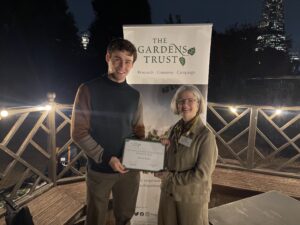Our annual essay competition is intended to encourage vibrant, scholarly writing and new research, especially by those who have not yet had their work published.
It is open to any student, worldwide, registered in a bona-fide university or other recognised qualification-awarding institution of higher or further education or who has recently graduated from such an institution no more than two years prior to submission. Submissions must be 5,000 to 6,000 words and the only restriction on subject matter is that it must be of relevance to some aspect of garden history which could include explorations of little-known gardens, or an aspect of botany, ecology, horticulture, archaeology, social history, architecture, design, art history or sculpture.

The prize includes an award of £500, free membership of The Gardens Trust for a year and consideration for publication in our peer-reviewed, scholarly journal Garden History. All previous winners have been accepted for publication, and often the best of the non-winning entries are invited to submit to the journal as well.
The rules and form for submission for the 2026 prize will be available here in due course. Any enquiries can be sent to essayprize@thegardenstrust.org
Mavis Batey
The annual essay prize was re-named in 2016 in honour of Mavis Batey (1921-2013), who served as both Secretary and then President of the Garden History Society (forerunner of the Gardens Trust). It seems a fitting memorial to such an inspirational woman, who did so much to build the discipline of garden history through her various roles in the garden history field.
Mavis Batey is particularly well known for her work on the gardens of Oxford and Nuneham Courtenay, where she lived with her husband Keith Batey. She became interested in garden history after starting her career as a codebreaker at Bletchley Park, and wrote numerous books on both subjects. She was awarded the Veitch Memorial Medal in 1985 and made a Member of the Order of the British Empire (MBE) in 1987 for her work on the conservation of gardens.
List of Essay Prize Winners and their Subjects
21st Mavis Batey Essay Prize 2025
The winner of the 2025 Essay Prize is Patrick Smith, for his essay on ‘Gardenesque Urbanism: John Claudius Loudon’s Metropolitan “Breathing Places”‘. Patrick graduated in architecture from the University of Cambridge this year and is now working for Initiatives In Design Architects in Richmond. He was presented with the award at the October launch of our report Harnessing Parks and Gardens in the 21st Century. The essay’s discussion of the reconciliation of urban growth with the innate human affinity for open space mirrors key messages from the report. Patrick said “I am honoured to receive the Mavis Batey Essay Prize from the Gardens Trust, especially given Batey’s tireless commitment to the preservation of parks and gardens. The subject of my essay – John Claudius Loudon – also, in the early 19th century, defended common land and called for the establishment of public parks. I hope that my analysis of his prescient work might contribute to our understanding of parks’ reformist origins, and that others may be inspired by Loudon’s rationality, optimism and far-sightedness.”
Two further essays were highly commended by the panel: Peter Williams, a PhD student at the Liverpool School of Architecture, wrote on ‘The Lost Landscapes of Trawsfynydd: Landscape Conservation in Conflict’, and Kari Traylor, an MPhil graduate of the University of Cambridge, on ‘Slave Gardens, Food, Production, and Power in Colonial Barbados, 1800-1833.’
20th Mavis Batey Essay Prize 2024
The winner of our 2024 Mavis Batey Essay Prize is Emma Poynter for her essay on ‘The production, use, and significance of the Hortus Malabaricus (1678-1693) in the creation of colonial botanical knowledge.’ Emma who graduated with an MPhil from Cambridge University said “I am delighted to have won the Mavis Batey Essay Prize 2024. Researching the Hortus Malabaricus has uncovered a rich intersection of colonial encounters, economic drivers, and contemporary curiosity in botany and the natural environment. I hope that this paper contributes to ongoing historical conceptions of how botanical knowledge has been gathered and made within the seventeenth-century context.” Emma was presented with her award and £500 prize at our Unforgettable Gardens book launch in October 2024.
19th Mavis Batey Essay Prize 2023
The winner of the 2023 essay prize is Abigail Carr, who completed the History of Medicine MA programme at Newcastle University, UK, for her entry: ‘”A park in which beauty and pure air could be united”: South Shields’ Marine Park and the Nineteenth-Century Conception of Health and Wellness.’ Within this essay she expertly explored the contested creation of the seaside Marine Park in South Shields and explained what a close micro-study of one site can offer to wider understanding of issues of tourism, health, pollution and class in this period. On winning the prize Abigail said: ‘I am very honoured to have won the prize and I hope that the essay contributes to our understanding of the rich history of the North-East’. She now plans to go on to doctoral study and has recently been employed as an intern in Special Collections at Newcastle University identifying important aspects of their medical humanities collections.
18th Mavis Batey Essay Prize 2022
Due to the strength of submissions this year, the judging panel decided to award a joint first place to Caroline Ikin for her essay: ‘Force, Fortitude, and Fortune’: John Ruskin’s gardening at Brantwood and to Henry Jacob for: An ‘Imaginary Landscape’: Bentham’s Botanical Vision for the Panopticon.
The judges felt that Caroline Ikin took a new approach in linking Ruskin’s moral purpose and his literary outputs with his garden developments which would add to our wider understanding of the wider role of gardens in this period. Similarly, the panel felt there was real originality in Henry Jacob’s reconsideration of the place of plants within Jeremy Bentham’s idealised architectural panopticon prison, and his relationship to the plant collecting of his nephew, the world-renowned botanist, George Bentham.”
Caroline Ikin said: ‘Thank you to the judges and the Gardens Trust for recognising my work through this award. It’s a great privilege to be awarded a prize with the name of Mavis Batey attached to it. I hope my essay will be accepted for publication in Garden History to enable me to share my doctoral research with a wider audience.’
Henry Jacob said: ‘I am honoured to receive this prize from an organisation whose values align with my own. This award has redoubled my commitment to conserve and celebrate landscapes through research. Encouraged by The Gardens Trust, I am currently investigating the history of the Parque Municipal Summit whilst in Panama. I am eager to remain involved with this special community over the coming years.’
17th Mavis Batey Essay Prize 2021
The prize was awarded to Anthony Davis, a student at the Bartlett School of Architecture, UCL for The Mirror in the Bike Shed, an essay about an Arts and Crafts style garden store of 1909. That might sound a bit of a far cry from the history of gardens but it isn’t if we see gardens buildings in their wider social context. Anthony challenged Pevsner’s famous comment ‘A bicycle shed is a building; Lincoln Cathedral is a piece of architecture’ using Baillie Scott’s garden tool and bicycle shed built for the single professional ladies who were the original inhabitants of Waterlow Court in Hampstead Garden Suburb, as an exemplar. The judges “considered it a lively and confident piece of writing that was articulate, well researched and contextualised – as well as being fun to read. We wondered what Pevsner would have made of it.”
16th Mavis Batey Essay Prize 2020
The winner of this year’s Mavis Batey Essay Prize is Nuard Tadevosyan, an MA [Art History] student at Queen’s University, Kingston, Ontario Canada, for her work on the use of the colour green in Della Robbia ceramics. Della Robbia’s workshop in Renaissance Florence worked almost exclusively in blue and white but introduced green as an unusual highlight for natural imagery. Nuard examined the history of green, its use in bucolic and pastoral poetry, and its use in these ceramics — whether for botanically precise garlands and flowers which helped emphasise the sacred nature of a particular subject, or its use in representing the sinister side of nature. The judges were impressed by her scholarship and the way that she took what seemed at first to be a very narrowly focused subject and gave it a broad treatment in a readable way.
The judges were also impressed by the painstaking scholarship of Stephanie Drew an MA student in Mediaeval Studies at the University of York who was highly commended for “Chasing the Dragon”. She took on the challenge of tracing the identity of a single plant – ‘dragaunce’ – in a medieval herbal, outlining the problems of both pre- and post-Linnean nomenclature. She showed how changes in terminology and methodology demonstrate the need for critical re-examination of historical sources and a review of editorial practices. It was a very impressive piece of work about a subject unfamiliar to many, but crucially important to anyone working in the field of plant history.
Both Nuard and Stephanie have been invited to submit their work for publication in Garden History.
15th Mavis Batey Essay Prize 2019
Dr David Marsh, chair of the judging panel writes: The winner of the 16th annual Mavis Batey Essay Prize was Susan Oldham, who recently obtained an MA from Leicester University. Her work is a speculative reconstruction of the early-18th century garden at Appuldurcombe on the Isle of Wight, based on detailed archival research.
Abstract:
“In the early eighteenth century Sir Robert Worsley laid out a garden to complement the new house he was building at Appuldurcombe on the Isle of Wight. Although the house survives as a shell, nothing remains of the original garden, which was remodelled by Lancelot ‘Capability’ Brown in the 1770s. Attention has traditionally been drawn to this later chapter in Appuldurcombe’s history, so this essay is an attempt to redress the balance to some extent by rediscovering the original garden in order to reveal a more detailed picture of Appuldurcombe as it was in Sir Robert’s time.
Evidence is drawn primarily from accounts kept by the estate steward, Sir Robert’s Journal of his Grand Tour, and his family correspondence. The accounts provide much of the evidence for the laying out and running of the garden and the park beyond. Sir Robert’s own manuscripts reveal that, in designing the garden, he was influenced both by the high-quality gardens he had admired abroad on his Grand Tour and those of his contemporaries. Although undeniably a symbol of prestige and status, Sir Robert’s garden was also a place of refuge for him from the responsibilities of his position. And, as an enthusiastic and knowledgeable gardener, it provided an opportunity for him to indulge his love of sowing and planting — his ‘reigning folly’.
Building up a picture of the original garden casts new light on Appuldurcombe as it was in the early eighteenth century and enables a better appreciation of the significance of this period in its history, and the important part played by Sir Robert Worsley.”
Susan was presented with the award at our AGM at The Queen’s College, Oxford in 2019 and her essay will be published in Garden History.
14th Annual Mavis Batey Prize Essay Prize 2018
Winner: Joshua Goh Ngee Chae
The Invention of the Kampong Garden:
Rural Nostalgia and Urban Gardening in Singapore
Published in GH 46:2 Winter 2018
13th Annual Mavis Batey Prize Essay Prize 2017
Winner: Yichi Zang
From Decoration to Necessity:
the functions of Public Parks in the British Concessions of China, 1842–1937.
Published as: From Enclosure to Necessity:
the functions of Public Parks in the International Settlement of Shanghai, 1842–1943
Published in GH 46:2 Winter 2018
12th Annual Mavis Batey Prize Essay Prize 2016
Our 12th Annual Essay Prize was renamed The Mavis Batey Annual Essay Prize in honour of our former President, the late Mavis Batey.
Winner: Ruth Oakley
One gigantic gallery: Land Art in Australia.
Published in GH 44:2 Winter 2016.
11th Annual GHS Essay Prize 2015
Winner: Josepha Richard
Uncovering the Garden of the Richest Man on Earth in Nineteenth Century Guangzhou: Howqua’s Garden in Henan China.
Published in GH 43:2 Winter 2015.
Highly Commended: Melanie Veasey
The Richest Form of Outdoor Furniture: The Open Air Exhibition of Sculpture at Battersea Park, 1948.
Published in GH 44:1 Summer 2016.
10th Annual GHS Essay Prize 2014
Winner: Karen Fitzsimon
Order In the Landscape: Rediscovering Preben Jakobsen.
Highly Commended: Suzanne Patman
A New Direction in Garden History.
Highly Commended: Nick Chibnall
The Palms of the Orient.
9th Annual GHS Essay Prize 2013
Winner: Jane Whitaker
The Old Arcadia, The Garden of the First Earl of Pembroke at Wilton, Wiltshire.
Published in GH 42:2 Winter 20164.
8th Annual GHS Essay Prize 2012
Winner: Johanna Lausen-Higgins
All the Gold a Miser Desires: A New reading for the Iconography of the Grotto of the Animals at Villa Castello.
Published in GH 40:2 Winter 2012.
7th Annual GHS Essay Prize 2011
Winner: Karin Seeber
‘Ye Making of ye Mount’: Oxford New College’s Mount Garden.
Published in GH 40:1 Summer 2012.
6th Annual GHS Essay Prize 2010
Winner: Laura Meyer
Landscape as Legacy: Elizabeth Percy, 1st Duchess of Northumberland, and the Gothick garden buildings of Alnwick.
Published in GH 39:1 Summer 2011.
Highly Commended: Sally O’Halloran
Keeping the Garden at Knolle, the gardeners of Knole in Seven Oaks, Kent, 1622–1711.
Published in GH 40:1 Summer 2012 [with Jan Woudstra].
Special Mention: Daniel Glass
Once Upon a Time in Mexico: Frida Kahlo’s garden at La Casa Azul, Coyoacán.
Published in GH 39:2 Winter 2011.
5th Annual GHS Essay Prize 2009
Winner: Judith Preston
A Polymath in Arcadia:Thomas Wright 1711–86.
Published in GH 38:2 Winter 2010.
Highly Commended: Janet Davidson Carter
Birkenhead Park.
Highly Commended: Helen Lawrence
New light on Thomas Archer as Garden Maker.
Published in GH 38:1 Summer 2010.
Highly Commended: Jim Bartos
The Spiritual Orchard: God, Garden and Landscape in seventeenth-century England before the Restoration.
Published in GH 38:2 Winter 2010.
4th Annual GHS Essay Prize 2008
Winner: Florence Clark d’Hardemare
The Follies of a King Duke.
Published in GH 37:1 Summer 2009.
3rd Annual GHS Essay Prize 2007
Winner: Paige Johnson
Proof of the Heavenly Iris: the Fountain of Three Rainbows at Wilton House, Wiltshire.
Published in GH 35:1 Summer 2007.
Highly Commended: Sarah Law
Liverpool/Calcutta exchanges: William Roscoe’s reappraisal of the first Linnaean Order of Plants.
Published in GH 35:2 Winter 2007.
Highly Commended: Jill Francis
Order and Disorder in the Early Modern Garden, 1558–c.1630.
Published in GH 36:1 Spring 2008.
2nd Annual GHS Essay Prize 2006
Winner: Christine Adams
Francis Bacon’s Wedding Gift of ‘A Garden of a Glorious and Strange Beauty’ for the Earl and Countess of Somerset.
Published in GH 36:1 Summer 2008.
1st Annual GHS Essay Prize 2005
Winner: Dr Clare Hickman
The Picturesque at Brislington House, Bristol: the role of landscape in relation to the treatment of mental illness in the early nineteenth-century asylum.
Published in GH 33:1 Summer 2005.


